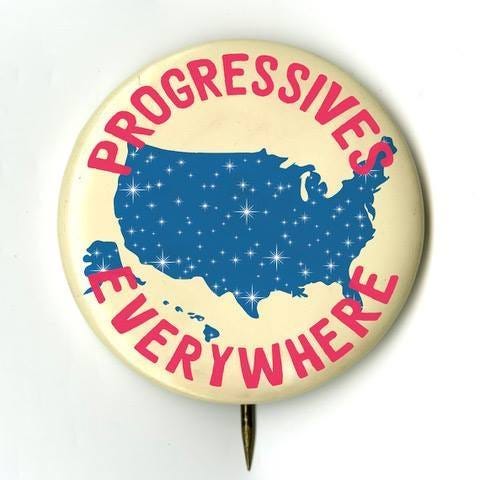Welcome to the big Sunday edition of Progressives Everywhere!
A quick update for you: On Tuesday, Republicans in the State Senate tabled the House bill that would have banned trans girls from participating in girls’ school athletics and subject kids to “genital examinations.” The retreat effectively killed the bill for this legislative session. We covered the bill in-depth in last Sunday’s edition of the newsletter, which featured an interview with one of its most outspoken opponents, Rep. Carlos Smith.
The bill’s quiet death is a big win for LGBTQ activists and progressive legislators, who took a strong stand and raised hell. It’s sad that we have to celebrate kids not being subjected to state-sanctioned sexual assault, but it’s a start.
In this edition of the newsletter, we’ve got:
A look at how labor unions can survive and grow in the era of Amazon and the gig economy;
Lots of big news
But first, thank you to our latest crowdfunding donors: Brian and Claire!
Where Do Unions Go From Here?
There were many reasons why organizers trying to unionize workers in the Amazon warehouse in Bessemer, Alabama lost the NLRB election by a sizable margin last month. The e-commerce monolith’s hyper-aggressive anti-union campaign (and significant rules violations) played a leading role, but there were also external factors at play.
Monopolization and financialization have wrested complete control of the American economy, destroying competition and leaving workers little leverage, especially in places like Bessemer where Amazon was seen as the only game in town. Unions, meanwhile, have been demonized by right-wing politicians and much of the mainstream media for the past four decades, and for even longer in the south, where unions were associated with civil rights and minority empowerment. Further, “right-to-work” laws have robbed labor unions of income and made organizing all the more difficult. And during the COVID-19 pandemic, anyone who doesn’t make their living from Wall Street has largely been just thankful to have some kind of paying job.
This is the paradox faced by labor unions and activists right now: income inequality continues to grow like a tumor on society, creating a class of hyper-elite billionaires hated by Americans of all political persuasions, yet the legal barriers and opportunity drought faced by workers right now makes organizing a risky proposition for many — even as a majority of voters support those trying to do it themselves.
Jonah Furman is a labor organizer who previously worked for Sen. Bernie Sanders and Rep. Alexandria Ocasio-Cortez and now runs a great union-focused newsletter called Who Gets the Bird?. I spoke with him last week to get a better sense of what we can take from the Amazon election, where the union movement should go from here, the class politics at play, and what to do about the exploitative gig economy.
Progressives Everywhere: The Amazon election failed, but what can we take from it?
Furman: I think the baseline context is that Amazon is the second-largest private employer in the country behind Walmart, and neither of those employers have had credible unionization campaigns in five to ten years, to be generous. And by credible, I mean something that does what the RWDSU did in Alabama, saying we're going to form an actual union here and use tactics to get legal recognition instead of creating public pressure, media pressure, and political pressure on Amazon to reform in some way.
So it broke the dry spell. It's crazy that you have this huge employer that no union is going after in a systematic way. There was no one opening any fronts for years; there's been no battles, no anything. So, I think one of the things is just breaking the seal and saying labor has to try to organize Amazon in the way that labor traditionally organizes.
What do you make of the other worker efforts around Amazon?
It seems to me that RWDSU in Alabama found a hot shop, which is a workplace that in a matter of months goes from zero to hundreds of people wanting a union. That’s not the conventional way for this to happen; usually, you build over years with a small committee, and they have issue-based campaigns and they grow and grow. So there’s a chance that the RWDSU has pulled the rest of the labor movement into a more credible plan for Amazon, despite losing in the first battle.
They are now in a position unlike what they were doing in Staten Island five years ago, where they were doing very press-friendly demonstrations, but not conventional unionization campaigns. The same goes for the Teamsters. There was that story out of Iowa, it seems like there was a national directive from the Teamsters saying your local union should look into organizing Amazon, and the Iowa group really ran with it and started going to the press saying, we're going to organize recognition strikes. They’re not going to take a vote on a union, they’re going to pressure Amazon with strikes.
One big hope I have is that what seems like a crazy rogue action by the Alabama RWDSU will hopefully pull in the rest of labor, make them stop being afraid to organize Amazon and put real resources into it, which I just don't think we've seen.

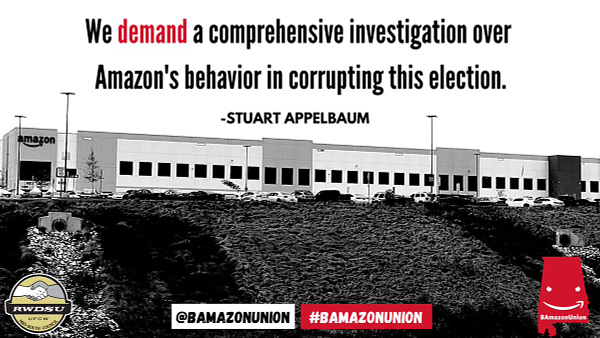
Why are they afraid? It seems like such a huge, juicy target with so many workers and public support.
If you're a union, you’re asking whether we should put millions of dollars of resources into organizing this huge company, which is betting the farm in some ways. Those are resources that aren't going to existing members and you could spend millions to get nothing back. I think SEIU’s Fight for $15 is an interesting example of this. The Fight for $15 never led to a single union member and it seems to some extent, SEIU then cut the funding after many years.
UFCW had a program called Our Walmart, which was to varying degrees involved in actually trying to organize Walmart. They did it for years, they had staff and then basically cut them loose because they’re spending millions on something that never netted a single union member. But I think Fight for $15 did amazing things for the political discourse and many states have passed big minimum wage raises, but it also didn't build SEIU and traditional membership.
What do you make of the growing number of other actions we’re seeing at Amazon warehouses and distribution centers?
I think some of them are really exciting. For several years, the Awood Center in Minnesota has mainly been organizing the Somali community that's heavily represented at Amazon and they've had walkouts and actions. Amazonians United is an interesting group of left-oriented, independent salts and activists that are in different Amazon warehouses.
But we haven't seen anything that stops production. We’ve seen a lot of labor activity that exists on a spectrum between protest and strike, some of the walkouts border on strike, but until you really threaten production in any systematic way… The Teamsters struck UPS in 1997 and Bill Clinton had to get involved in the strike because distribution was so shut down in the US. So I'm not saying you have to get to a national scale before it matters, but it does seem like if you're not getting to a place where Jeff Bezos has to deal with actual provisions at the workplace and pay, real nuts and bolts stuff, I don't think you're at the point of wielding power at Amazon.

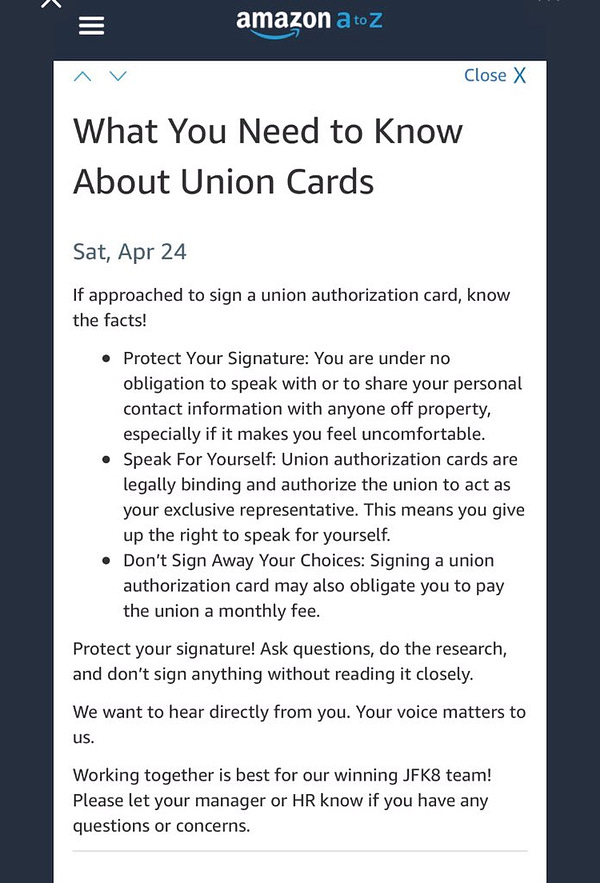
As a long-time journalist, I’ve watched magazines and digital newsrooms unionize at an incredible rate. Many tech workers are doing the same. What do you make of more “white collar” workers starting to unionize? Do you think it’ll change the perception of labor unions?
I do think that the culture around unionization has changed for sure, just look at public opinion polling.
There are newly downwardly mobile professions or industries — journalists have had unions for a long time, but the incredible attack on journalism as an industry and the fallout on its workers is new.
There are new immiserations of working-class people and blue-collar people every day, but it’s these moments of increased intensity [that spur unionization]. If since 1975 your job has been the bottom of the barrel and there's never been an increase or decrease because it's just a shit job and you have no rights and no benefits and are not making a living wage, it's hard to imagine what's going to thrust your industry into some kind of activity.
With the teacher strikes of recent years, it’s hard to identify an exact distinct cause, but the 2008 financial crisis caused a massive plummeting in K-12 funding, especially in the states that ended up seeing big strikes. It made it newly horrible for these workers, versus warehouse workers who have been making $7.25-an-hour in the past 10 years and are not going to make less and are not going to make more.
So one of the reasons we're seeing “higher status” workers taking more union action is that the “lower status” workers have already been ground into dust. You can't universally say that, but it's hard to make the case to a worker that something has changed now, except for the social consciousness aspects.
Increasingly, we’re seeing blue-collar workers — often union members — voting for Republicans and middle-class professionals voting for Democrats, whose policies should be better for workers (though it’s often been the lesser of two evils). It’s a switch from what we’ve seen before, to some degree. Why do you think that’s happening?
I was just reading Rick Perlstein’s Barry Goldwater book, Before the Storm and it talks about how in 1964, at the union gates, the UAW and Steel Workers were massively voting for Goldwater. There’s some data saying it really picked up in the Reagan era, but it's not a new phenomenon to have union members voting out of line with their unions’ choices politically.
I do think there's a general decay of institutions; it means less to be a union household now than it did 50 years ago for a lot of those union members, and it also has meant less to be a Democrat. I think this might have changed in the Trump era, but it meant less to be a Democrat in 2015 than it did in 1965. So, I'm not convinced that there's a growing divide between the union base and the union’s political decisions.

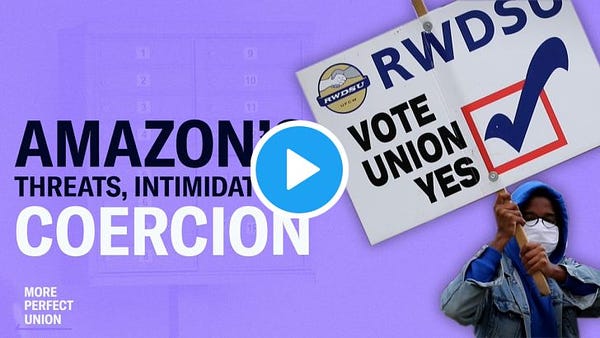
Companies and employers are increasingly choosing to contract out work or rely on gig workers instead of hiring people full-time. Those workers are far more vulnerable to mistreatment and have little bargaining power on wages and benefits. Do you envision unions trying to find a way to include them and work with them?
They have to organize those workers. There's just not really another option.
One of the former AFL-CIO presidents in the ‘70s, George Meany, had this quote that everyone in labor cites all the time about why union density was falling: “Why should we worry about organizing groups of people who do not appear to want to be organized?... The organized fellow is the fellow that counts.” And that can remain true as long as the gig workers are over there and the union work is over here, but as we've already seen, UPS has now instituted some limited personal vehicle delivery drivers, which is an inch closer to the Uber Eats delivery service model.
Maybe when Prop 22 comes for unionized workers, then the unions will feel compelled to respond, but if you look at it, much like Amazon, there have been very limited efforts to organize these workers in a conventional way using strike tactics and committee building and just the standard union organizing tools.
Other than that and a lot of lobbying from the New York Taxi Workers Alliance and the Rideshare Drivers United in California and a few other groups here and there, there hasn't been anyone saying we're going to actually organize these workers into illegal strikes and illegal unions [illegal due to laws like Prop 22]. It's not satisfying to say maybe it'll get bad enough that there'll be a reaction, but there's no alternative model than organizing that leads to collective action, whether you call that a union or something else.
Check out Jonah Furman’s excellent labor-centric newsletter here!
Important News You Need to Know
Here are a few stories from around the country — I deliver longer coverage of more news, keep up on these stories, and publish interviews throughout the week in the issues sent out to premium members!
Voting Rights
Arizona: The nutbag state GOP, which is lurching right from the party of John McCain to the party of Andy Biggs, is kicking off an “audit” of the 2020 election results, presumably to back up the voter suppression laws they want to pass. Notably, it will only focus on Maricopa County, where Joe Biden built his winning edge. There have already been two audits done by the county, but this one will be done by a private firm and is supported by the genius lawyer Lin Wood.
Here’s the funny part, though: Republican State Sen. Kelly Townsend shocked her colleagues by voting against the law because she wants to wait for the audit to be completed (and also because she’s bitter that none of her election bills moved forward). Just watch this video:

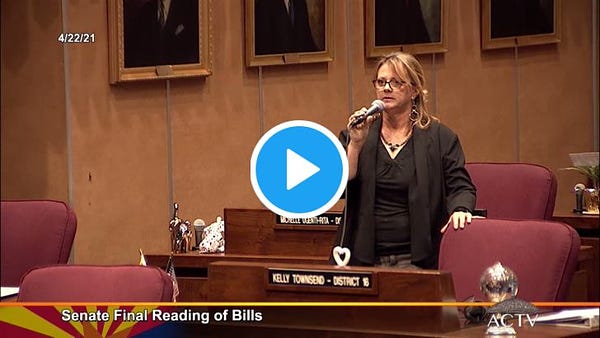
This is a big deal because this law would toss up to 200,000 lower-frequency Arizona voters off of the permanent vote-by-mail list, which until now has been a national gold standard. The audit is a bunch of malarkey and won’t turn up any actual fraud (unless it’s rigged from the start, which is a strong possibility given who is performing it). It would not be a shock if Townsend changed her vote anyway, but it’s fun to see a Republican civil war for the time being.
Kansas: It’s a good thing that governorships can’t be gerrymandered. Some of Democrats’ biggest wins in 2018 were in gubernatorial races in states controlled by Republican trifectas like Kansas, Michigan, and Wisconsin. In Kansas, Gov. Laura Kelly has blocked a whole lot of bad GOP policies, including their two new voter suppression bills. The two bills would have banned people from collecting ballots from anyone other than family members and banned the governor, secretary of state, or courts from changing election laws. Very relevant:
The ballot-collection bill would have also helped Republicans with a key policy goal: saving state abortion restrictions endangered by a Kansas Supreme Court decision in 2019 protecting abortion rights. GOP lawmakers were joined in efforts to revise election laws by abortion opponents who fear that abortion-rights canvassers could collect thousands of ballots to defeat a proposed anti-abortion amendment to the state constitution on the August 2022 ballot.
This is the state that used to be governed by religious zealot Sam Brownback, so voters defeating an anti-abortion ballot amendment would mark quite a turnaround.
Kelly’s veto pen was busy this week, as she also nixed a Republican bill that would have barred trans girls from playing school sports. The GOP does not have enough support for the bigoted law to override her veto, killing the legislation.
Florida: Unfortunately, the GOP has complete control of the Sunshine State, so like many of their state GOP brethren, Florida Republicans are working to pass their own new voter suppression bill. The proposed law took a step forward last week, passing through the State Senate. Thanks to some initial outrage, the bill is not as bad as it could have been, but it’s still crappy enough that it’s actually being opposed by many county election officials, including plenty of Republicans.
Among the provisions are stringent voter ID requirements on mail-in voting (especially when using drop boxes), a limit on who can drop off ballots, and a ridiculous signature-matching process.
Ohio: On Thursday, Republicans leaked the outline of a new voter suppression bill. Though the GOP angrily disowned the leaked draft that I broke 10 days ago , this one is nearly exactly the same. The only real difference is that this bill allows three drop boxes to be placed in county boards of elections offices for 10 days leading up to Election Day.
Idaho: Following several successful ballot initiatives, Republicans in Idaho passed severe new restrictions on the process that will but make it all but impossible to get an initiative before voters. If that wasn’t evidence enough that they don’t care what voters think, a new report indicates that an overwhelming majority of Idahoans who emailed Gov. Brad Little on the matter urged him to veto the bill.
Quibis
Colorado: The Colorado State Senate just passed a bill that would allow undocumented immigrants to obtain professional licenses, opening up a world of career opportunities:
“We heard for years that hardworking immigrants who want to obtain these professional licenses to become plumbers, electricians, nurses, or teachers wanted to contribute and found themselves unable to do so,” said one of the bill’s sponsors, Sen. Julie Gonzales, D-Denver.
This is one of a growing number of state legislature bills aimed at providing significant help for undocumented immigrants. In New York, the excluded worker fund will provide record stimulus benefits to mostly undocumented immigrants, while Connecticut is moving closer to making undocumented families eligible for Medicaid.
Texas: The Texas GOP continues to refuse to expand Medicaid. The federal government has been trying a carrot-and-stick approach to convince the GOP to finally bite the bullet, but even with the allure of a $1.6 billion carrot and the sting of the Biden administration’s revocation of a health care payment waiver, the GOP still refuses to budge. Their recalcitrance is really hurting rural hospitals, which disproportionately hurts their most loyal voters. Not that there’s anything new about that.
Grounded: United Airlines was given a $5 billion bailout last year in the CARES Act. Now, it’s looking to fire 2,500 unionized workers and replace them with cheaper outsourced labor. Not that there’s anything new about that.
North Carolina: Here’s a great story on State Rep. Ricky Hurtado and what his successful campaign means for a part of the state with a fraught history with changing demographics, the progressive movement, and a Democratic Party that was not all that welcoming of his candidacy. Progressives Everywhere ran an interview with Hurtado last summer and raised money for his campaign; the dynamic young founder of an educational nonprofit wound up flipping his district blue by just 477 votes. Every little bit counts.
New York: To put a proper wrap on this edition of the newsletter, read this uplifting story about a local union that’s backing gig delivery workers who cannot technically unionize.
Wait, Before You Leave!
Progressives Everywhere has raised over $6 million dollars raised for progressive Democratic candidates and causes. Isn’t that cool?
That said, none of that money goes to producing this newsletter or all of the related projects we put out there. Not a dime! In fact, it costs me money to do this. So to make this sustainable and to ensure that I can continue to spotlight important candidates/organizations and raise money for them, I need your help.
I’m offering very low-cost premium subscriptions that offer a lot of goodies. If you become a member of Progressives Everywhere, you’ll get:
Premium member-only emails featuring analysis, insight, and local & national news coverage you won’t read elsewhere.
Exclusive updates from candidates and interviews with other progressive leaders.
Coverage of voting rights, healthcare, labor rights, and progressive activism.
Interviews with and the ability to help the little-known, up-and-coming candidates who wind up leading the progressive charge when they win office.
The satisfaction of financing new projects and news coverage.
A new best friend (me).
You can also make a one-time donation to Progressives Everywhere’s GoFundMe campaign — doing so will earn you a shout-out in an upcoming edition of the big newsletter!




